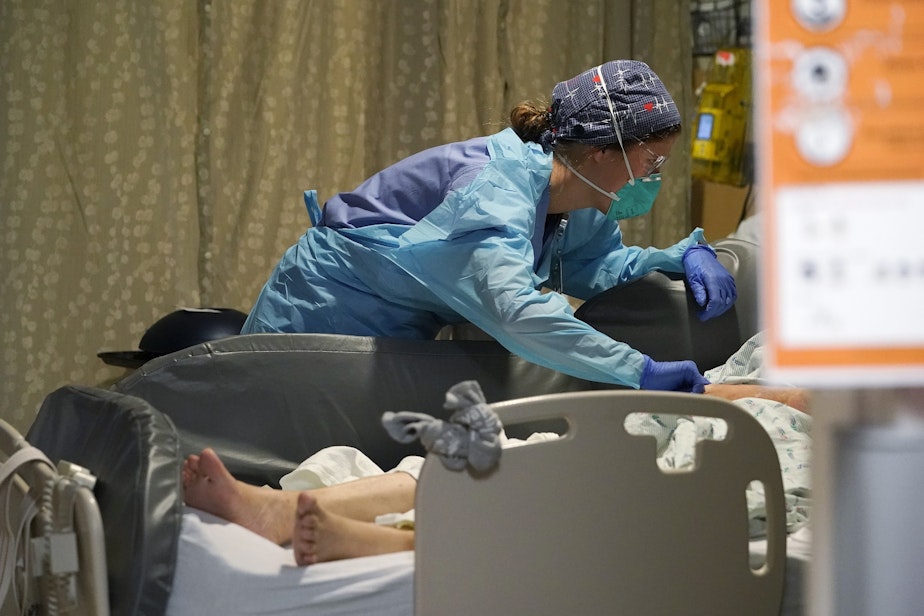Covid updates today for Seattle area: 50% fewer cases

Updated news about the coronavirus pandemic in Seattle and Washington state.
According to data from King County and Washington state departments of health, as of Monday, February 7, 2022:
- +4,069 new cases since Friday in King County. That's -51% over the last seven days. An average of 1,552 new cases are emerging each day.
- +81 new hospitalizations since Friday in King County. That's a 35% decrease over the past seven days.
- 25% decrease in deaths over the past two weeks, with seven people dying every day in King County. The county reports 18 new deaths since Friday.
- 78.3% of King County residents are fully vaccinated.
- 10,967 Covid-19 related deaths across Washington state; 1% death rate since the beginning of the pandemic.
Why remdesivir, a highly effective treatment, is a last resort for providers
In late December, as the omicron variant surged, the roster of early Covid-19 treatments was looking slim. Newly authorized pills for Covid-19 were in short supply. Several monoclonal antibody drugs didn't seem to work.
Then an older drug, remdesivir, emerged as an effective option.
Over the past year and a half, the drug — sold in the U.S. under the brand Veklury --had been used in hospitals to treat very sick patients with Covid-19. But new data from the drugmaker Gilead showed that remdesivir could also help high-risk patients avoid the hospital. In other words, it could help patients with medical conditions like immune suppression and diabetes prevent severe Covid-19 disease.
While the drug had shown mixed results in studies as a treatment for hospitalized patients, it has proved surprisingly effective, according to Gilead's data, at treating patients early in the course of the disease. Public health experts say it could be enormously useful at a time when other early Covid-19 treatments – such as monoclonal antibodies and Covid pills – are unavailable or in short supply. But the drug hasn't gotten much traction among health care providers because it takes significant time, staff and resources to give out.
The results of Gilead's study on using remdesivir early in the course of illness, published in The New England Journal of Medicine, were "truly dramatic," says Dr. Jane Kelly, assistant state epidemiologist for South Carolina, who is not affiliated with the study. "It resulted in an 87% lower risk of hospitalization or death than placebo."
Those results put it on par with monoclonal antibodies and Paxlovid, a Covid-19 pill – the best available Covid treatments out there. Its side effects — mainly, nausea — are tame for most people.
Other traits add to remdesivir's appeal. It's the only early treatment available to children under 12. Plus it works against omicron – while some other early treatment options do not. And, while other early treatments are in short supply, there's plenty of remdesivir to go around.
Read more here.
—Pien Huang, NPR
King County’s Covid case numbers have been falling since January…
But they’re still very high. The county is now seeing more than 2,000 a day, on average. That's about a third fewer than a month ago.
King County Public Health officer Dr. Jeff Duchin says that’s an improvement, but it’s too soon to celebrate.
“I just want to express my tremendous relief to see our case numbers falling since January 10," Duchin said. "I really hope this decline continues. But for right now, there's still a whole lot of Covid-19 going on.”
Hospitalizations also remain high. Duchin said while the worst is behind us, there’s still a lot of uncertainty because Covid is unpredictable.
Sponsored
“We are making meaningful progress," Duchin said. "At the same time, we need to be realistic about where we are on this long and winding road to the post-pandemic state.”
Duchin said there’s no guarantee that future variants will be mild. And, it’s uncertain how much longer this pandemic lasts. But, he said, at least we're headed in the right direction.
— Ruby de Luna, KUOW
Americans get sicker as omicron stalls heart surgeries to cancer care
After every shift in his Seattle emergency department, Dr. Matt Beecroft comes away with some new story of how the omicron surge is making his patients sicker.
Sponsored
And not just from the coronavirus that causes Covid-19.
Instead, it's the delays and disruptions in medical care — a consequence of overcrowded and short-staffed hospitals — that are leading to, at times, life-threatening complications.
"It can be just heartbreaking," says Beecroft, who recalls one recent patient of his who had a heart attack. "She had been scheduled for a cardiac bypass," a procedure done to improve blood flow when there's an obstructed or partially blocked artery, "but that surgery had been canceled."
Beecroft, who's affiliated with the American College of Emergency Physicians, told two other doctors about the patient. That's when it became clear to him that this was far from an isolated event: "Between the three of us, we had seen four patients who had cardiac complications from not being able to get a cardiac surgery."
There's no way to quantify how many Americans are now suffering serious, if not irreversible, harm to their health because hospitals are buckling under the weight of the omicron variant of the coronavirus. But doctors say the consequences are far-reaching, given how many procedures have been postponed.
Read more here.
— Will Stone, NPR




